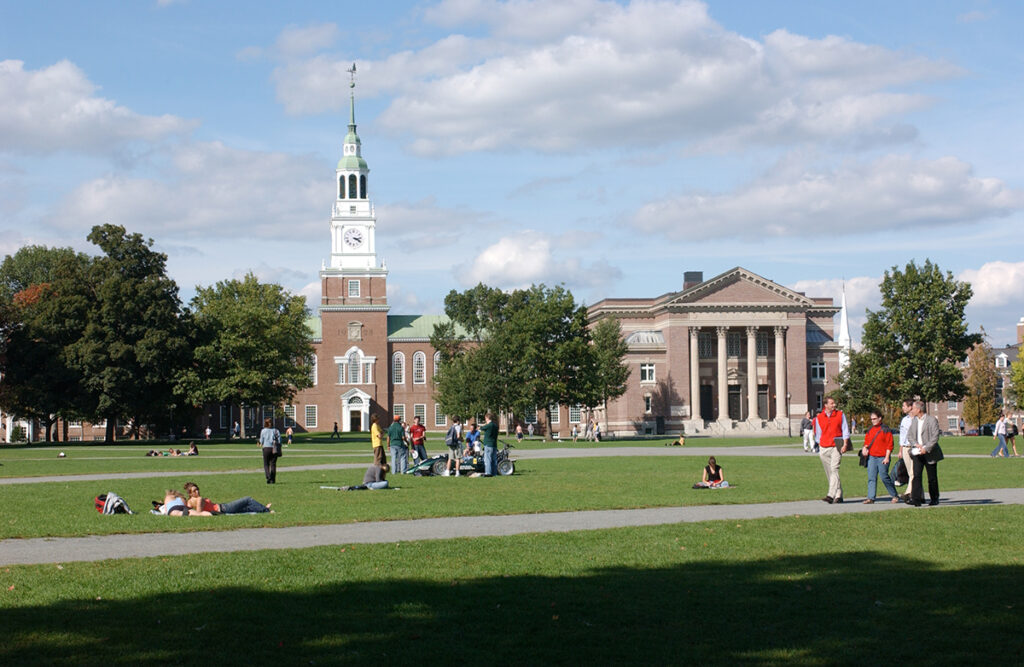
Call me old fashioned (many do), but I think the best work is done in person, in an office, face-to-face with—or at least a short walk down a hallway from—one’s co-workers. Born of the same philosophy, full return-to-office policies post-COVID are gaining traction among major employers across the nation. And yet, in the past two years, we’ve learned that a significant (or at least vocal) proportion of employees are ardently and publicly resistant to such a push. It is not fully worth delving into the circuitousness of the arguments typically made in favor of a continued virtual workspace, but it is significant that the topic continues to grace headlines. In recent news, take Elon Musk’s X, the platform formerly known as Twitter, and the very public resistance of software engineer Yao Yue to Musk’s reinstatement of mandatory, consistent work from the office (i.e., see “A Labor Right to Work From Home,” The Wall Street Journal, October 17).
At Dartmouth, it is likely that a majority of students and parents feel that students’ return to in-person classes in the 2021 fall term, once the student body at large had been fully vaccinated, came rather belatedly. But by the next term, the winter of 2022, the Administration was actively discouraging “hybrid” classes even to accommodate those with COVID; and, in the spring, masks disappeared from the policy books and (by and large) from campus.
However, somewhat remarkably—or perhaps unremarkably, depending on how you look at it—College staff and administrators remain unequivocally entrenched to this day in the “hybrid” work model, according to which they may work virtually from home at least several days a week. How do I know this, you may ask? No, I’m not privy to statistics regarding the modern equivalent of the punch card. Quite simply, when I have questions, I think it is easier, quicker, less subject to confusion, and overall more practical to ask those questions in person. In the recent past, I’ve walked to the Rockefeller Center, the Blunt Alumni Center, the Office of the Registrar, the Alumni Magazine, and innumerable other representations of the campus administrative state, and I’ve found that it is difficult to locate people of whom to ask my questions in the first place. What I typically find in their stead are dark rooms, locked doors, and the occasional sign that reads something like, “I’m working from home on Monday, Tuesday, Thursday, and Friday. Please email me.” Suffice it to say, we have on campus our very own subscribers to the indefinite COVID approach.
I have also been able to view online a “telecommuting agreement” for Dartmouth employees. This agreement provides a blank space in which to enter a start date (but no end date) for hybrid work, notes that fully remote work may in fact be possible, and presents at long last the rather tepid notation that hybrid or remote employees “may be required to be physically present in the office with reasonable notice according to business needs.”
Any truthful student will assure you that he or she was less productive and learned less while classes were being held virtually. While I cannot attest to the quality of the College bureaucracy’s work product, I can assure you that Dartmouth students’ campus experiences are still being negatively impacted by this subscription to the combined power of Zoom and email. Students were not suddenly in the clear in the fall of 2021 when they returned to in-person classes. Staff and administrators continue to work virtually, and this affects students. Indeed, peers tell me—and my recent experiences confirm—that, combined with the rather more than one-hour lunch break that seems to be embraced across campus, an added layer of impersonal, bureaucratic distance is being created that serves students’ initiative and self-advocacy poorly. Surely these are “soft” skills that ought to be acquired while an undergraduate.
Microcosm that it is of national trends, the College remains subservient to that which will be the death of the American work ethic: the rejection of the interpersonal office tradition that once so clearly defined American enterprise. For its part, The Dartmouth Review maintains an office in downtown Hanover, and I know well that this office is nothing short of critical to the paper’s continued, vibrant existence. If our intrepid staffers constitute The Review’s lifeblood, injecting the organization and these pages alike with the lively spirit that attends free thought and expression, then our office provides grounding, a necessary corporeality that binds us enduringly to The Review’s historical mission. As a matter of practice, our office is a space that facilitates the best in communication, collaboration, and a job well done.

During Covid there was a classification of “essential” and “non-essential” workers. Essential were “allowed” and expected to be on-site at work. While I personally think all people are essential, I will submit that the “work from home” people have classified themselves.